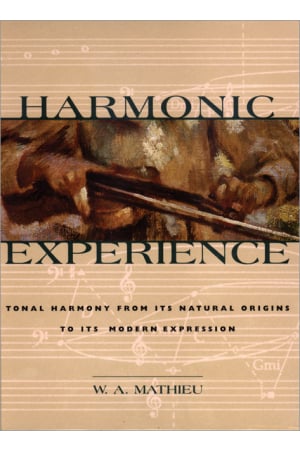Harmonic Experience
Tonal Harmony from Its Natural Origins to Its Modern Expression
- Edition: Second Printing with Additions and Corrections
- Pages: 576
- Book Size: 8.5 x 11
- ISBN-13: 9780892815609
- Imprint: Inner Traditions
- On Sale Date: August 1, 1997
- Format: Hardcover Book
- Illustrations: 100 musical examples
W. A. Mathieu, an accomplished author and recording artist, presents a way of learning music that reconnects modern-day musicians with the source from which music was originally generated. As the author states, "The rules of music--including counterpoint and harmony--were not formed in our brains but in the resonance chambers of our bodies." His theory of music reconciles the ancient harmonic system of just intonation with the modern system of twelve-tone temperament. Saying that the way we think music is far from the way we do music, Mathieu explains why certain combinations of sounds are experienced by the listener as harmonious. His prose often resembles the rhythms and cadences of music itself, and his many musical examples allow readers to discover their own musical responses.
Editor's Preface
Introduction
Part 1: Harmonic Purity: Feeling the Numbers
1 Seeing Air and Touching Sound
2 Singing Unison with a Drone
3 Singing Octaves
4 Singing Perfect Fifths
5 Singing Major Thirds
6 A Map of Harmonic Relationships
7 The Perfect Fifth Below: Hello Mother
8 The Major Third Below
9 The Central Section of the Map Completed
10 The Five-limit Lattice of Twelve Notes
11 Available Modes: Lydian Through Phrygian
12 Mixed Modes
13 Internalizing the Lattice
14 Numbers and Mysteries
15 Chomatic Pairs
16 Beyond Twelve Notes: The Extended Five-Limit Lattice
17 The Seventh Partial and Beyond
18 The Practice of Pure Harmony
Part 2: The Selective Use of Equal Temperament
19 Leaping from Paradise
20 Six Unambiguous Chords
21 Twelve Unambiguous Chords: Tonal Harmony within the Lattice of Twelve
Notes
22 Unambiguous Triadic Harmony in the Extended Lattice
23 Dronality in Equal Temperament: Mixed Modes
24 Dronality in Equal Temperament: Mixed Modes
25 Chromatic Pairs and the Magic Mode
26 Pushing the Magic Mode Envelope
Part 3: The Function Commas of Equal-Tempered Tonal Harmony
27 Comma Phenomena
28 Didymic Pairs of Tones
29 Didymic Pairs of Triads
30 The Great Diesis: The Beauty of the Beast
31 The Tonal Array of the Great Diesis
32 The Diaschisma
33 Quasi-functional and Nonfunctional Commas
34 The Shape of Tonality
Part 4: Harmonic Practice, Analysis, and Review of the Theory
35 Practical Matters
36 A Small Syllabus of Diatonic Sequences
37 Cadential Practices: Parallel Borrowing
38 The Long Cadence: A Comprehensive View of Cadential Energy
39 Tonicization and Modulation
40 Modal Modulation
41 A Syllabus of Cyclic Sequences
42 Symmetrical Harmony and the Dissolution of Tonality
43 The Notation of Positional Analysis
44 Review of the Theory
Afterword
Glossary of Terms
Glossary of Singable Tones in Just Intonation
Sources
Acknowledgments
General Index
Index of Ratios
Index of Most-Referenced Examples, Figures, and Tables
"This book goes beyond what most textbooks offer, and its highly original pedagogy deserves the attention of every teacher of harmony. Above all, this is a book for anyone who would like to acquire harmony as a lived experience rather than as mere memorization of unyielding rules on paper."
"Mathieu is consistently proving himself to be one of the best in musical theory."
"This volume offers experiential keys to help unlock the mystery of how music works its deep affect upon us. Harmonic Experience extends any reader's understanding of music and is a user-friendly, elegant and graceful work. It is a technical treatise about the inner workings of music."
“Harmonic Experience opens the door to a genuine renewal of music’s fundamental structure. At once an experience of discipline and freedom, it makes the ear aware of the finest subtleties of tuning at the core of harmony and does this in a way that clarifies the perception of our culture’s music while inviting the crossing of cultural boundaries.”
--Ben Johnston, composer
“Harmonic Experience is the Rosetta stone of music. It turns harmonic theory into a web of ah hah’s! What has been a tangle of inexplicable concepts is transformed into a repertory of generative experiences. Mathieu puts together what no one has put together before.”
--Will Johnson, professor of music, Sonoma State University
“This book is an epic investigation into the hierarchy of musical tendencies of just intonation and how these make equal temperament function the way it does. Everybody has been shaking their heads about the relationship between the two systems, but Harmonic Experience clears up the confusion and shows how to apply the central energies of harmony toward music of your own making.”
--Terry Riley
“Mathieu’s books are worth reading for anyone in any field of music--jazz, classical, gospel, or any other. He’s found the words to tell the power of music.”
--Pete Seeger
“Mathieu is consistently proving himself to be one of the best in musical theory.”
--John Coltrane, in 1962
Harmonic Experience offers a comprehensive view of music that reconciles the ancient harmonic system of just intonation with the modern system of twelve-tone equal temperament. Saying that “the rules of music were not formed in our brains but in the resonance chambers of our bodies,” W. A. Mathieu recognizes the pronounced need for an experiential kind of teaching that reconnects the way we think music with the way we do music. Mathieu provides over one thousand musical examples and diagrams to illustrate the ideas he presents, allowing readers to reach a deeper level of response, to hear existing musical compositions more clearly, and to become thoroughly engaged in their own musical creativity.
W. A. MATHIEU is the author of The Listening Book and The Musical Life. His compositions and solo piano music have been extensively recorded. He lives in Sebastopol, California, where he writes, composes, and teaches.



